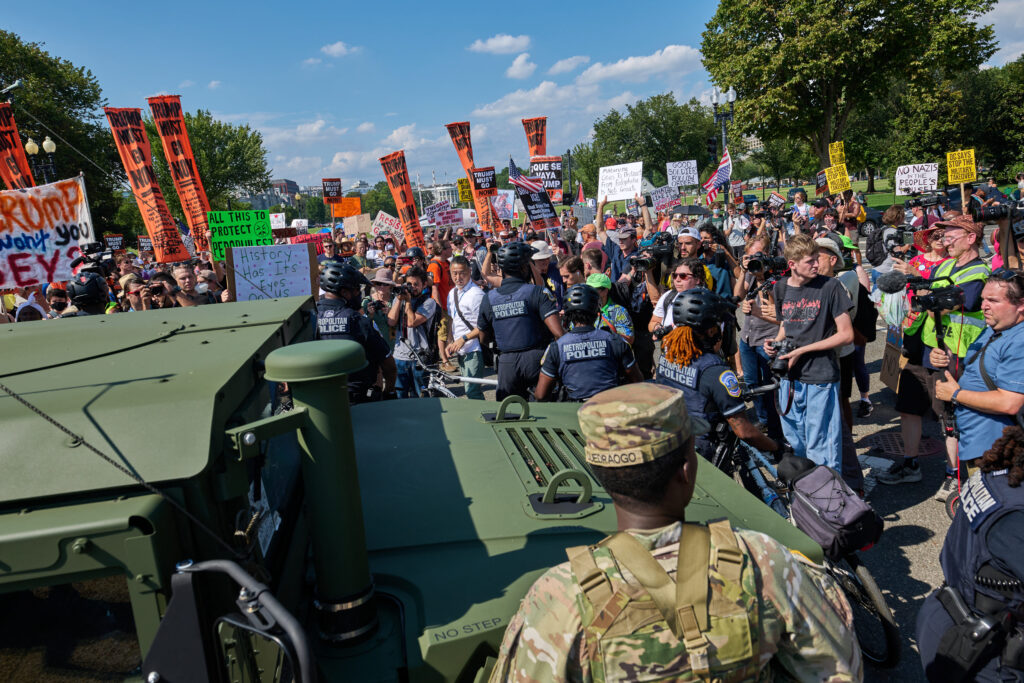Trump’s Takeover Renews Push for D.C. Statehood

President Donald Trump’s crackdown on Washington, D.C. under the false pretense of out-of-control crime is reigniting the decades-long push for statehood for the district.
D.C.’s over 700,000 residents — around 45% of whom are black — lack full political representation because they cannot elect members of Congress and their local government remains under federal control. The district has a larger population than Wyoming and Vermont, and pays more federal income taxes than over a dozen states.
It’s a glaring democratic deficit that has flared as a national issue at times in recent years. But Trump’s move to flood the district with federal agents and National Guard troops and attempt to take over its police department has again brought the issue to the fore — with residents of the district seeing it as an assault on their already limited political autonomy.
In a letter earlier this month, 77 local and national organizations urged members of Congress to respond to Trump’s attempted takeover by passing legislation making D.C. the 51st state.
“The President’s actions make clear once again that Americans in D.C. are second class citizens in their own country,” the letter reads. “We must right this historic wrong by providing Washingtonians with full voting representation in both chambers of Congress.”
Around 80% of D.C. residents oppose Trump assuming control of the district’s police department and using troops to patrol the streets, according to a recent Washington Post and Schar School poll.
The same poll found record support for D.C. statehood in response to Trump’s actions. Over 70% of polled residents said they favor the district becoming a state — the highest figure recorded since 1993 when the Post began regularly asking about statehood.
Many of the protests in the district against Trump’s takeover have doubled as demonstrations in support of D.C. statehood.
Washington, D.C. residents have endured a lengthy and unique form of disenfranchisement compared to citizens in the 50 states.
Though Washingtonians can vote for president and can elect some local leaders, they do not have equal representation in Congress.
Residents do not have a senator and have only symbolic representation in the House, meaning they are subject to federal law while lacking the ability to influence federal laws and policies that directly affect them. And any local laws their elected leaders pass are subject to congressional review and can be modified or overturned by Congress.
Recent congressional efforts to grant D.C. statehood have failed in the Senate.
For the first time in history, D.C. statehood legislation passed the House in 2020 in response to Trump’s aggressive use of the National Guard against Black Lives Matter protests in the district. However, the bill was never brought to a vote in the Republican-majority Senate.
The same bill passed the Democratic-led House again in April 2021 but also again died in the Senate. Though Democrats held the Senate at the time, the bill was again not brought to a vote after moderate Democrats said they either did not support the legislation or did not agree with ending the filibuster to pass it.
Trump was largely able to commandeer D.C. because of its unequal status as a federal district.
Since D.C. is not a state, it does not have full control over the D.C. National Guard, which is instead under the direct authority of the president. And Trump was able to federalize the D.C. Metropolitan Police (MPD) through the Home Rule Act of 1973, which allowed residents to elect their mayor and council members.
Section 740 of the act, which before Trump had never been invoked, gives the president the ability to request the use of the MPD for federal law enforcement purposes “whenever [he] determines that special conditions of an emergency nature exist.”
Trump and his political appointees have also attempted to use the crackdown to subvert the district’s reduced autonomy.
Though the president’s Section 740 authority is limited to no more than 30 days without Congress passing an extension, Trump claimed last week he could get around Congress and maintain control over the MPD for the foreseeable future.
“If it’s a national emergency we can do it without Congress,” Trump claimed.
Attorney General Pam Bondi through a directive last week also attempted to effectively replace MPD Chief with the head of the Drug Enforcement Administration. Bondi retracted that portion of her directive after a federal judge said it likely violated the Home Rule Act.
Before that same judge, Department of Justice attorneys said Trump will have no authority to continue using the MPD without congressional approval once Section 740’s 30-day stipulation is up.
The Trump administration in recent days has taken steps to expand the crackdown, asking several Republican governors to deploy members of their own National Guard units to D.C. and arming troops with service weapons.
Trump Friday said he may declare a “national emergency” to keep troops in D.C. “as long as I want.”
Reacting to Trump’s power grab, D.C. Mayor Muriel Bowser said earlier this month called for statehood for the district.
“We’re not a state,” Bowser said. “We don’t control the D.C. National Guard. We don’t have senators or full autonomy. Limited home rule gives the federal government the ability to intrude on our autonomy in many ways.”
“My message to residents is this: We know that access to our democracy is tenuous. That is why you have heard me and many many Washingtonians before me advocate for full statehood for the District of Columbia.”